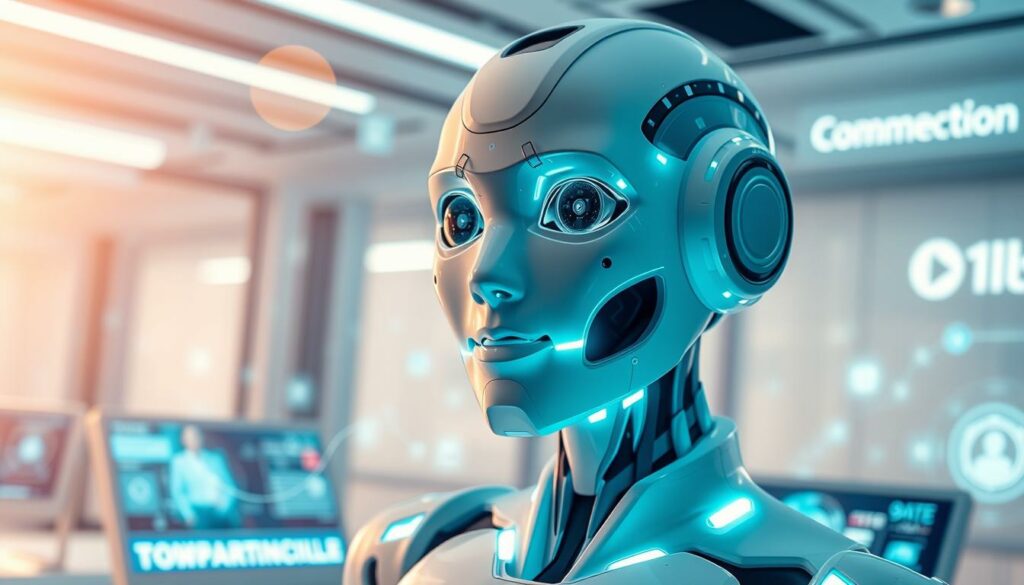Adding an AI agent for customer service is smart. It meets high customer expectations with real service. Businesses could lose $3.7 trillion globally by 2024 due to bad service. Using artificial intelligence customer support is essential, not just a passing trend. AI agents improve interactions with natural language skills, learning, and handling data on the spot. They predict and meet customer needs well.
The conversational AI market will likely hit over $15.7 billion a year by 2024. This is due to a need for better customer service automation. Consider Sparebank 1 SR-Bank and its AI, Banki. Banki does as much work as 38 full-timers, increasing the bank’s ability by 195% without extra people. Also, the Temkin Group found that 77% of happy customers will promote a brand. Great customer service plays a key role in encouraging this support.
For Chief Information Officers (CIOs) across sectors, virtual agents are top among AI tools. They are praised for improving First Contact Resolution (FCR) rates. They also provide quick first responses, cutting down on support tickets. They give fast, correct answers.
Key Takeaways
- The conversational AI market is set to exceed $15.7 billion annually by 2024.
- Sparebank 1 SR-Bank’s virtual agent performs the equivalent of 38 full-time employees’ work.
- 77% of customers are likely to recommend a brand after a positive experience.
- AI agents enhance First Contact Resolution (FCR) rates and ensure immediate first response times.
- Virtual agents are the primary AI-based application in various industries according to CIOs.
The Role of AI Agents in Modern Customer Service
In today’s fast-changing customer service scene, AI agents play a vital role. They change old support models into something new. As virtual assistants, they offer non-stop support and make things smoother. They deal with many requests at once and solve tough issues. This improves service and makes customers happier.
Understanding AI Agents in Customer Support
AI agents use smart tech like natural language processing and machine learning. Salesforce says AI could make agent work 39% faster. These smart agents can talk to many customers at once. This means they answer questions quicker. Zendesk found that AI can take over up to 80% of customer chats. This lets human agents handle more important jobs.
AI vs. Traditional Customer Service Models
AI agents and traditional service models are quite different. Old models depend on human agents who can only talk to one customer at a time. This often makes customers wait longer, leading to unhappiness. On the other hand, virtual assistants handle many talks at once. They answer quickly and lower the cost of running things. McKinsey & Company says AI doesn’t just save time. It also helps human agents give better service to more people. This boosts work efficiency and customer happiness.
| Aspect | AI Agents | Traditional Models |
|---|---|---|
| Response Time | Immediate | Variable |
| Handling Volume | Multiple Inquiries | Single Inquiry |
| Cost Efficiency | High | Moderate |
| Productivity | Increased by 39% | Limited |
Using AI in customer service can save lots of money. For example, Unity saved $1.3 million by using an AI agent to handle 8,000 tickets. Rentman, too, uses AI for quality checks. This keeps their CSAT scores at 93%. They also respond to people in 60 to 70 minutes. These examples show that many businesses can use AI. It makes their customer service better and more efficient.
Benefits of Using an AI Agent for Customer Service
Companies always look for ways to better connect with customers. Using AI for customer service is smart and effective. AI agents cut costs and make both customers and human agents happier and more productive.
Cost Reduction and Operational Efficiency
Adding an AI chatbot makes support cheaper by handling common questions and tasks. Accenture says AI could make workers 40% more efficient. This lets companies use their resources better. Also, AI can reduce the number of support calls, lowering costs even more.
Predictive analytics help predict trends from past data, making companies more efficient and better planners. Gartner thinks by 2027, chatbots will be the main way companies talk to customers.
Improving Customer Satisfaction
AI gives quick, right answers, making customers happy. Despite high expectations, most people struggle to solve their issues easily. AI chatbots fill this gap with speedy, reliable support. Tools like predictive analytics make support more personal, lifting satisfaction scores.

AI understands and predicts feelings, making support more caring and accurate. Salesforce found 69% of people are okay with AI helping to improve service.
Enhancing Human Agent Productivity
AI agents reduce human agents’ workload, letting them tackle more specialized tasks. Toister Performance Solutions notes 59% of agents could get burnt out, with 28% at high risk. AI eases this by taking over simple questions and making work smoother.
Using AI in support teams lets humans do more important work. They get AI-suggested answers, which cuts down waiting times and boosts efficiency. In the end, AI and humans work together to provide top-notch service.
- Predictive analytics tools can forecast customer needs.
- Self-service AI chatbots reduce operational costs and enhance efficiency.
- AI routing and speech analytics personalize customer experiences.
| Feature | Impact on Cost | Impact on Efficiency |
|---|---|---|
| Automated Customer Service Agent | Reduced Operational Costs | Increased Efficiency |
| AI Chatbot for Support | Lower Inbound Call Volume | Enhanced Customer Satisfaction |
| Predictive Analytics | Better Resource Allocation | Improved Strategic Planning |
How AI Agents Work in Customer Service
Artificial intelligence has changed customer service for the better. It makes businesses more efficient and improves support. AI agents help with this by adding to how we traditionally help customers.

Natural Language Processing and Machine Learning
AI agents use natural language processing (NLP) and machine learning (ML). These technologies help them understand and answer customer questions in a way that seems human. For example, they can get what people mean, their mood, and what they want. This means they give better answers.
They also get better over time by learning from the questions people ask. This makes them more in tune with what customers need.
Automating Routine Tasks
AI agents are great at taking over simple, repeat jobs. This cuts down on the amount of work human agents have to do. They handle things like password resets and checking orders, making things run smoother.
This lets human agents deal with harder problems that need a personal touch. So, AI not only saves time but also makes services better.
Personalization and Real-Time Data Analysis
AI makes customer service more personal. It looks at what customers like and how they’ve interacted with services before to give custom help. Plus, being available all the time means customers get help whenever they need it.
AI’s smart planning and learning help it guess what customers will need. This way, it can solve problems before they become bigger issues. This really makes customer service better.
The use of AI in businesses is growing because it’s so helpful. AI in customer service is now essential. It enhances customer experience through smart automation and personalized care.
Implementing AI in Your Customer Service Strategy
Adding AI to your customer service is a step-by-step process. It starts with figuring out your needs and picking suitable AI technologies. This guide highlights key steps, challenges, and examples to boost your customer service with AI.
Steps to Integrate AI Agents
To bring in an AI customer service agent, start with your business goals. Know where AI fits best. Here’s what you need to do:
- Identify Business Needs: Set clear targets like improving customer happiness, cutting costs, or handling more queries during busy periods.
- Select the Right AI Technologies: Pick AI tools such as chatbots, digital assistants, or systems based on NLP that meet your needs.
- Develop a Knowledge Base: Create a solid knowledge system so AI agents can get the right info fast.
- Train Your AI: Use machine learning to keep making your AI smarter with new data and feedback.
- Launch and Monitor: Start small with a test program, watch how it does, and adjust based on what you learn.
Challenges and Considerations
Introducing a virtual assistant brings big changes but also challenges. Keep these points in mind:
- Privacy and Security: Protect customer data well, following laws like GDPR.
- Customer Expectations: Be clear about what your AI can do to avoid surprises and ensure a smooth service.
- Employee Training: Train your team to work with AI seamlessly, reducing pushback and making integration easier.
- Scalability: Make sure your AI can deal with more interactions over time without dropping quality.
- Multilingual Support: Add AI that can translate languages on the fly to help customers from anywhere.
For insights on AI in action, see this LinkedIn article. It covers strategies and advantages of AI in customer service.
Case Studies of Successful AI Deployments
Many firms have seen great results from using AI:
| Company | Improvement |
|---|---|
| Zendesk | Handled more queries efficiently and cut costs. |
| Unity | Boosted satisfaction by offering round-the-clock support via AI chatbots. |
| Shopify | Emphasized 24/7 support with live chat and email. |
| Sephora | Used AI chatbots for personalized product advice and answering questions. |
| Amazon | Used AI for tailored product suggestions and marketing messages. |
These success stories show the power of AI in customer service. For more on enhancing customer happiness with AI, read this article by Sixtysixten on Business Process Automation.
Conclusion
Using an AI agent for customer service is now a necessary step, not just a future idea. Companies in sectors like retail, healthcare, and finance have seen big benefits from AI tools. They handle many tasks at once, cut down on wait times, and make operations run smoother. Plus, AI agents work all the time, making sure customers get help whenever they need it.
AI agents create valuable data about what customers like and do. Businesses use this data to make smart choices. Platforms like Salesforce Service Cloud show how AI improves scale and efficiency. They mix AI, CRM, and automation, helping businesses deal with more customers without losing quality. A big majority of leaders, 84% to be precise, are happy with using AI this way. Almost all of them, 91%, think AI will make customer service even better.
Keeping customers happy and loyal is key, and AI agents are great at giving personal, accurate, and consistent help. This reduces mistakes and builds trust with customers. The call center AI market is set to grow big, from $1.95 billion in 2024 to $10.07 billion by 2032. Adding AI to customer service is essential for staying ahead in today’s market. AI optimizes resources, enhances data analysis, and keeps service quality high. It truly changes the customer service game, making efficiency and satisfaction better than ever.
FAQ
What are the benefits of using AI agents for customer service?
AI agents help businesses meet customer expectations better. They use advanced technology to make interactions smoother. This means happier customers and lower costs for the company.
How do AI agents differ from traditional customer service models?
Unlike old customer service methods, AI agents handle lots of requests fast. They take care of easy tasks so people can focus on harder ones. This makes customers happier and service better.
How do AI agents improve customer satisfaction?
AI agents make customers happier by answering fast and accurately. They adjust to what each customer needs. This leads to better service and loyal customers.
What technologies do AI agents use to provide customer support?
AI agents use big language models and natural language processing to understand customers. They learn over time to get better at helping and can do tasks automatically.
How do AI agents in customer service reduce operational costs?
AI agents lower costs by doing routine jobs, needing fewer people for support. This also makes the team more efficient and saves money.
In what ways can AI agents enhance human agent productivity?
AI agents handle simple tasks, letting human agents do more important work. This improves how much they can do and the service quality.
What are the steps to integrate AI agents into a customer service strategy?
To add AI agents, you need to plan by looking at what you need, picking the right AI, protecting privacy, setting expectations, and training your team.
What challenges should be considered when implementing AI in customer service?
You should think about keeping customer data safe, making sure customers know what to expect, and training your team to use AI properly.
Can you provide examples of successful AI customer service implementations?
Zendesk and Unity show how AI can really help by handling more requests, cutting costs, and making customers happier. These cases prove AI’s value in customer service.



